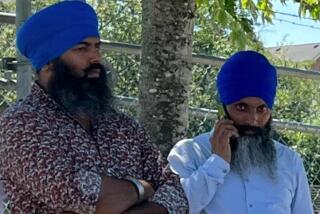Shock of Sikh Leader’s Assassination Eases Sectarian Enmity in Punjab
- Share via
AMRITSAR, India — The killing by Sikh extremists of moderate Sikh leader Harchand Singh Longowal appears to have changed the complicated political-religious equation that governs life here in Punjab state.
In Sikhism, bloodshed, revenge and martyrdom play large roles, and many extremists continue to demand autonomy for Sikh-dominated Punjab and to hotly oppose Hindu authority.
But now, with Longowal’s death, many Sikhs who had been out for blood are softening their positions. Likewise, many Hindus who had been seething with resentment over Sikh militancy appear ready to forgive.
On the day of Longowal’s cremation, many of the city’s Hindu merchants--for the first time in anyone’s memory here--closed their shops in honor of a Sikh.
“More than 90% of the Hindu shops closed their doors,” Amritsar superintendent of police S. Likhi said.
Salil Kapoor, a lawyer and member of an old Hindu family here, said, “I think it (Longowal’s death) hurt the Hindus even more than the Sikhs, because we thought he was a man of peace.”
Saw No Sikh Future
After the Indian army raided the Sikhs’ Golden Temple here in June, 1984, Dalbir Singh thought there was no future for India’s 15 million Sikhs. “All Sikhs are terrorists now,” Singh, a prominent Sikh textile mill owner, said at the time.
The ensuing wave of killings appeared to bear out his pessimism. Last October, Prime Minister Indira Gandhi was assassinated by two Sikhs, and several thousand Sikhs were subsequently killed by Hindu mobs in New Delhi and northern India.
More political figures and police officials, Hindus and Sikhs alike, were killed before an agreement was reached last month between the government of Prime Minister Rajiv Gandhi and the main Sikh political party, Akali Dal.
Longowal, 57, president of Akali Dal, signed the pact with Gandhi. Four weeks later, on Aug. 20, he was shot to death by four brother Sikhs.
“There has been a very big change in the psychology of the Punjab,” Dalbir Singh said in the wake of the slaying. “There is a widespread feeling that Longowal’s death is a loss to Hindus and Sikhs.”
Also, Singh said, the new mood may ultimately work to the benefit of Gandhi, whose mother ordered the Golden Temple assault.
Warming to Gandhi Seen
“I think that in a few years’ time the Sikh people will learn to love Rajiv Gandhi,” he said.
Gurdev Singh, a local leader of the Akali Dal, said: “The extremists have not got any program. They do not care about the country. They don’t want communal harmony; actually, they are against it. They say we should be totally separate from the Hindus.”
On his desk were stacks of telegrams and letters from Sikhs and Hindus alike condemning the slaying of Longowal.
There is evidence that the extremists may have isolated themselves to some extent even from their own political ally, the United Akali group. The organization is led by Joginder Singh, 83, father of Jarnail Singh Bhindranwale, the Sikh extremist leader who was killed in the Golden Temple raid.
At a weekend meeting of the group, Joginder Singh, who has been a bitter critic of the Longowal-Gandhi accord, approved a resolution condemning Longowal’s assassination. The Sikh elders at the meeting then observed two minutes of silence.
On Wednesday, however, Joginder Singh announced that United Akali has decided to boycott the elections and to renew its struggle for Sikh autonomy. He charged that Gandhi had ordered the voting to cover up “continuing atrocities against Sikhs by security forces” and to lend credibility to his accord with Longowal.
And, in fact, most extremists have not changed their opinions. Mukhwinder Singh Sandhu, secretary at the Amritsar headquarters of the All-India Sikh Students’ Federation, the main organization of Sikh extremists and separatists, said:
“Rajiv Gandhi is worse than his mother. After her assassination, thousands of Sikhs were killed--burned alive. Women were raped.”
Gathered around Sandhu as he spoke the other day were half a dozen of the movement’s workers. One of them, Bhupinder Singh, had been released a few days earlier from the Amritsar jail, where he had been held for taking part in a violent demonstration against Longowal after he signed the Punjab agreement.
Many of these young men were devoted followers of Bhindranwale. Like him, they consider most outsiders to be entirely ignorant of their affairs.
‘Duty to Kill Them’
Harinder Singh Kahlon, the student federation leader, was asked if he thought the Longowal killing was a cowardly act--Longowal was unarmed except for the ceremonial dagger that all Sikhs carry. He replied:
“A person who kills another person to save his religion is not a coward. Sikhs never kill anybody who is innocent. Sikhs protect women, old men and the helpless. But if one takes the course of repression, it is our duty to kill them.”
The extremist students say they have 10,000 underground supporters in the Punjab region of India and neighboring countries. About 7,000 others, they say, are in jail.
Many of these young men celebrated Longowal’s death, as they had celebrated the assassination of Indira Gandhi, by passing out candy.
“We were happy to hear the news,” Bhupinder Singh, the young man just out of jail, said. “Longowal was a traitor to the Sikh nation. Longowal bartered away Sikh rights.”
Later, on the grounds of the Golden Temple, another young militant approached a reporter. He said he had fought with Bhindranwale against the army. He was glad that Longowal had been killed, he said, then smiled and added that Longowal will not be the last victim of communal violence.
More Violence Expected
Almost everyone in Amritsar, including police officials, believes there will be more violence in the weeks ahead, particularly against candidates for office in the state elections scheduled for Sept. 25. Punjab is the only Indian state in which Sikhs hold a majority.
“Naturally there will be extra dangers, for which we must be alert,” J. Singh Sadhu, a Sikh and sub-inspector of police, said.
Om Prakash Seghal, a pharmacist and leader in the Hindu community, said, “Definitely there is going to be more terrorism in the Punjab with this election.” In April, Seghal was attacked and injured by two Sikh gunmen. The year before, his son was shot. Now he has an armed, full-time guard.
It is not going to be easy to find candidates for the 117 seats in the Punjab state assembly and the 13 seats in the lower house of Parliament. Some people have already turned down nominations.
‘It Would Be Suicide’
One of them, Ranjit Mehra, a Hindu hotel manager who declined an offer from Gandhi’s Congress-I Party, remarked, “It would be suicide. . . . There is no way I want a ticket. I need a ticket like I need hole between my eyes.”
Local party official Gurdev Singh said the party plans to enter candidates in all the races, but he acknowledges that there is a problem. “If the government cannot protect Mrs. Gandhi,” he said, “and if it cannot protect Sant (Saint) Longowal, how can it protect so many candidates?”
More to Read
Sign up for Essential California
The most important California stories and recommendations in your inbox every morning.
You may occasionally receive promotional content from the Los Angeles Times.













